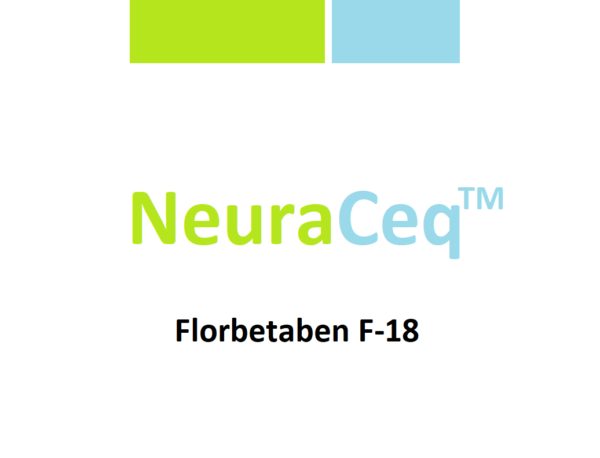Florbetaben F-18 (NeuraCeq) is an intravenously administered radiopharmaceutical agent that is used to detect Beta-amyloid plaques in patients with Alzheimer's disease.
Florbetaben F-18 Uses:
-
Brain imaging:
- It is indicated for positron emission tomography (PET) imaging of the brain to estimate beta-amyloid neuritic plaque density in adult patients with cognitive impairment who are being evaluated for Alzheimer's disease and other causes of cognitive decline.
Florbetaben F-18 (NeuraCeq) Dose in Adults
Note: Measure the dose by a suitable radioactivity calibration system immediately before administration. The dose may vary depending on the patient's body weight and image acquisition parameters.
Florbetaben F-18 (NeuraCeq) Dose in Brain imaging:
- IV: 8.1 mCi (300 MBq);
- maximum: 30 mcg mass dose
Use in Children:
Not indicated.
Pregnancy Risk Factor C
- It has not yet been tested in animal reproduction studies.
- It should be avoided during pregnancy, as radiopharmaceutical products can cause harm to the fetus.
- Women with reproductive potential should avoid pregnancy.
- After injection, Florbetaben F18 may be detected using radiation dosimetry.
Florbetaben F-18 use during breastfeeding:
- It is unknown whether breastmilk contains florbetaben 18.
- Manufacturers recommend that you avoid it while breastfeeding, or discontinue breastfeeding temporarily for 24 hours after administration.
- Breastmilk can be pumped, then discarded until breastmilk is resumed. You can give formula milk to your infant or breastmilk that you have previously stored.
- Radiation dosimetry can detect F18 in breast tissue.
Dose in Kidney Disease
There is no dosage adjustment provided in the manufacturer's labeling.
Dose in Liver disease:
There is no dosage adjustment provided in the manufacturer's labeling.
Side Effects of Florbetaben F-18 (NeuraCeq):
-
Local:
- Pain at injection site
- Erythema at injection site
- Irritation at injection site
Contraindications to Florbetaben F-18 (NeuraCeq):
The manufacturer's labeling does not contain any contraindications.
Canadian labeling: Additional contraindications not in US labeling
- Allergy reactions to florbetabenF18 or any component of this formulation
Warnings and precautions
-
Malignancy
- Patients who are exposed to high doses of radiation cumulatively run the risk of developing malignancies.
Monitoring Parameters:
Monitor for allergic reactions.
How to administer Florbetaben F-18 (NeuraCeq)?
- It is administered as a slow single intravenous injection @ 6 seconds/ml in a total volume of 10 ml or less.
- Avoid diluting it. After the drug is administered, flush the intravenous line with NS to ensure full delivery of the dose.
- After 45 - 130 minutes of the injection, initiate PET imaging. Maintain the patient in a supine position with the brain-centered in the PET scanner field of view.
- Since it is a radiopharmaceutical, appropriate handling and precautions should be taken while disposing of.
- Waterproof gloves should be worn and effective shielding should be used during handling and administration.
Mechanism of action of Florbetaben F-18 (NeuraCeq):
- The drug is intravenously administered and crosses the blood brain barrier to attach to the brain's b-amyloid plaques.
- A PET scanner detects the positive signals produced by F18 isotope.
Distribution:
- about 6% of the total dose is distributed to the brain 10 minutes after administration
Protein binding:
- 98.5%
Metabolism:
- Predominantly catalyzed by CYP2J2 and CYP4F2
Half-life elimination:
- about 1 hour
Time to peak, plasma:
- Plasma concentrations declined about 75% and about 90% at 20 and 50 minutes, respectively
Excretion:
- Urine: ~30% (12 hours after administration)
International Brand Names of Florbetaben F-18:
- NeuraCeq
Florbetaben F-18 Brand Names in Pakistan:
No Brands Available in Pakistan.







